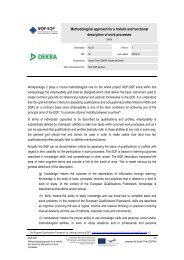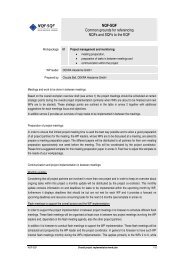Overview of National Qualification frameworks - Project-Nqf-Sqf
Overview of National Qualification frameworks - Project-Nqf-Sqf
Overview of National Qualification frameworks - Project-Nqf-Sqf
Create successful ePaper yourself
Turn your PDF publications into a flip-book with our unique Google optimized e-Paper software.
Secondary Technical and Vocational Colleges (BHS or Berufsbildende höhere Schulen)In addition to providing in-depth general education, over a period <strong>of</strong> fi ve years berufsbildende höhereSchulen (BHS) give students an advanced vocational train-ing, culminating in a Reife- orDiplomprüfung (matriculation or diploma exam). This entitles them to admission to university, highertechnical colleges and post-secondary colleges. Universities and higher technical colleges are requiredby law to give students credit for specialized knowledge acquired by BHS graduates.Once they have worked in their fi eld for three years, graduates <strong>of</strong> most höhere technische and höhereLand- and forstwirtschaftliche Lehranstalten (higher-level secondary industrial, agricultural and forestrycolleges) may apply to the Federal Ministry <strong>of</strong> Economics and Labour or the Federal Ministry <strong>of</strong>Agriculture, Forestry, Environment and Water Management for authorization to use the pr<strong>of</strong>essionaltitle <strong>of</strong> "lngenieur".The most important higher-level secondary technical and vocational colleges:● Höhere technische and gewerbliche Lehranstalten (higher-level secondary industrial and tradecolleges)● Höhere Lehranstalt für Mode, für künstlerische Gestaltung, für Produktmanagement und Präsentation,Modedesign und Produktgestaltung (higher-level secondary college for fashion, artistic design, productmanagement and presentation, fashion design and product design)● Höhere Lehranstalt für Tourismus (higher-level secondary college for tourism)● Handelsakademie (higher-level secondary commercial college)● Höhere Lehranstalt fur wirtschaftliche Berufe (higher-level secondary college for occupations in thefood and beverage industry)● Höhere Lehranstalt für Land- und Forstwirtschaft: (higherlevel secondary college for agriculture andforestry)● Bildungsanstalt für Kindergartenpädagogik (kindergarten teacher-training college)● Bildungsanstalten for Sozialpädagogik (teacher-training colleges for social education)Educational Courses after MatriculationThe qualification for admission is Reifeprüfung (matriculation exam), Berufsreifeprüfung (vocationalmatriculation examination) or an entrance examination.Kollegs (specialised post matriculation courses): These are two-year full-time (or two to three-yearpart-time) advanced level vocational courses equivalent to higher-level technical and vocationalcolleges.Post-secondary colleges● Training 1: Public and private post-secondary colleges train teachers for positions at primary schools(including pre-school), general secondary schools and special schools, as well as polytechnic colleges.● Training 2: Some public post-secondary colleges train teachers for positions at vocational colleges,for technical/trade areas <strong>of</strong> specialization, for the specializations <strong>of</strong> design and nutrition, and to teachinformation and communication at BMS or BHS colleges.● Training 3: The college <strong>of</strong> agricultural and environmental pedagogy <strong>of</strong>fers training for positions atagricultural and forestry vocational colleges and technical colleges as well as for positions in agricultureand environmental studies at higher agricultural and forestry colleges.● Training 4: Private pedagogic colleges and several private institutions train religious instructionteachers (Catholic, Evangelical, Old Catholic, Orthodox, Eastern Orthodox, Islamic, Jewish) atcompulsory schoolsUniversities <strong>of</strong> Applied Sciences (Fachhochschulen)Scientifi cally grounded vocational training with a strong practical orientation (usually one semester <strong>of</strong>vocational experience). The following types <strong>of</strong> courses are currently <strong>of</strong>fered:● Diplomstudien (diploma courses): generally last 8 semester (4 years) and conclude with the academictitle <strong>of</strong> "Mag. (FH)” or “Dipl.-Ing.(FH)”. Diploma courses are gradually being replaced by Bachelor’scourses or continuation study on Master’s courses.● Bachelorstudien (bachelor’s degrees): generally last 6 semesters (3 years) and conclude with theacademic title <strong>of</strong> “Bachelor”. In some subjects, particularly in the area <strong>of</strong> social work and healthservices, graduating also entitles you to practise the relevant vocation (e.g. social worker,physiotherapist).




